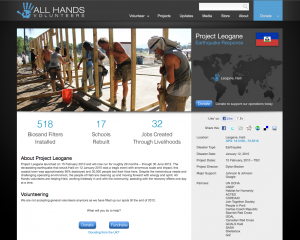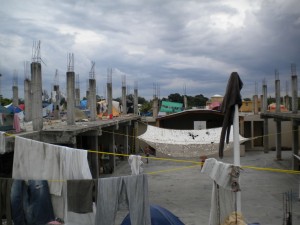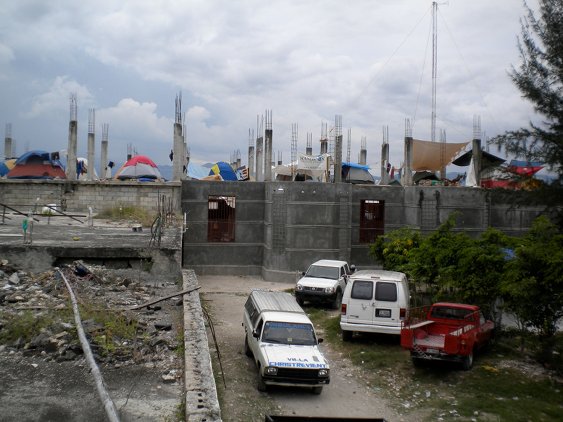Two months ago, THAC was invited to lead a discussion following a showing of the Al Jazeera report, “Haiti After the Quake.” The showing was hosted by Socialist Action as part of their recurring Rebel Film Series. My colleague Ajamu and I went to represent THAC.
The program is pretty interesting, and conveniently, it’s available on YouTube:
The program covers a wide range of topics: from the sluggishness of the initial international response, to the stunningly bad priorities of Non-Governmental Organizations (NGOs) operating in the country.
I was pretty sure that Ajamu was going to cover the subject in his usual analytic way, so I decided to talk about some stories relating to my own personal experiences working with an NGO a few months after the earthquake. I ended up taking away from that experience three key conclusions that reinforced my suspicion of NGOs in Haiti. And I wanted to ensure that those conclusions were documented somewhere.
As I said at the time, you can’t be involved in Haiti activism for long before you begin to understand the negative role various NGOs have played in the destabilization of the country. For my part, I’ve often pondered the “baby/bathwater” thoughts on the topic: are all of the NGOs problematic? Certainly NGOs like FOCAL and similar thinktanks who spend their time making a case for neoliberal reforms in Haiti have pushed toward a vision of Haiti that’s linked to the undermining of democracy and stability in the country. And other groups like CARE and Save the Children seem to remain in the country for long periods of time without any real accomplishment. But I figured that there must be some good organizations operating there. And sure, I still think that. No one can dispute that Partners in Health has been a force for good in Haiti. And MSF continues to do good work — largely because they’re politically astute and include political analysis as part of their process of starting their missions.
For my part, in June, 2010, I returned to Haiti to volunteer for an NGO. I spent a couple of weeks in Leyogàn working with a group called All Hands (although, at the time, it was called Hands On Disaster Relief, or HODR). I learned about the group from my friend, Alan, who had volunteered with them in Biloxi, Mississippi after Hurricane Katrina. To some extent, I think that their approach to channeling volunteer labour is somewhat clever. Much of what they provide is basic logistics to allow volunteers to arrive for periods anywhere between a week to a year (or possibly more — I’m not sure). They organize a running list of gigs that need anywhere from two to a dozen volunteers. Each night, folks sign up for the next day’s job — there are probably a dozen going at any one time. Jobs might be “rubble” jobs (clearing up rubble from collapsed buildings) or “tarp” jobs or even volunteer gofers at a nearby hospital.
When I was there, there were about 100 international volunteers. I guessed that the average age was maybe a touch older than university. Most people were enthusiastic, friendly, earnest (in the way that only idealistic university-age people can be), and hard-working. To some extent, I think that many of the people there were there more because they wanted to travel in a foreign country than because of any real altruism. And this isn’t just speculation on my part; I had lots of conversations with people about what brought them there.
The organizers were good-natured, mostly reasonable, and (I’m sure) had all the best intentions. Unlike the worst stories of NGO excesses, the group didn’t splurge on expensive SUVs or four-star hotel rooms. Our living arrangements were quite modest: we were set up in a partially-constructed building. Some areas had roofs over our head, but there was only one office space that had enclosed walls. Many of us had tents and sleeping bags. Me, I choose to throw my sleeping bag down on one of the bunk beds that had been constructed from basic lumber.
The First Conclusion: It’s Not About Me
The first item I talked about was actually the last of the three insights that emerged from my experiences with All Hands. And it was basically formed by an article in the Toronto Star, written by Catherine Porter. Here’s an excerpt:
If you want to help Haiti, take a vacation there. Send money to a charity you trust working on the ground. Even better, set up a micro-credit loan for a single mother so she can rebuild her shattered market stall and send her kids to school.
Just don’t go down there to volunteer for two weeks.
I know, you want to help personally. That’s noble. But your good intentions might have the opposite effect: you would be paying to do a job a Haitian is literally starving for, and the normally neglected child you are holding for a few days in a run-down orphanage might be damaged from your affection.
Those are big statements. Let me uncrate them.
Voluntourism is the new ecotourism. One 2008 survey revealed that one in five travellers had volunteered on their vacation — most of them working on small construction sites, but some helping in orphanages, teaching English, protecting egg-laying turtles in Costa Rica, cleaning up garbage at the base of Mount Everest . . . The pricey trips are marketed as “meaningful travel.” Promotional websites usually feature a white adult smiling with a black child.
I’ve been to Haiti eight times in the past year, and every flight — save the first one, which was an aid shipment — has been packed with young people in matching T-shirts on a mission. Most were with church groups planning to rebuild a school or orphanage. Some were hosting “crusades,” which are healing church services, they told me. Others planned to play with babies in orphanages, teach English in schools or help out in tent camps around the city.
Think of it this way: a $600 round-trip ticket to Haiti is just $130 short of the annual income of the average Haitian. You shouldn’t pay to do that job. A Haitian should be paid to do it.
There is no lack of labour power in Haiti. There is no lack of brain power in Haiti. What Haiti lacks are tools and money.
In an important way, I think that we need to think more about ways that help Haiti that don’t include us taking a hands-on role. There was very little that we international volunteers did there that couldn’t have been done by the local folks. Maybe we need to get out of the way more.
The Second Conclusion: NGOs Get Distracted
As I said, earlier, the day-to-day planning of work at the camp was organized around jobs. One evening, I signed up to help move a medical storage room. This is a bit of an interesting story.
About three lots over from the All Hands base camp was a space that’d been converted into a field hospital. There were a number of inflatable hospitals that we’d heard so much about set up there. Nearby, there was a large, old house which the medical team was using for living quarters, and a bit closer to the road was a new concrete building. I later learned that the building was a residence building for a nursing college. Apparently Leyogàn has the country’s only accredited nursing school, and this building near our camp was built as a students’ residence. A few rooms in the residence had been commandeered by the medical clinic: one hallway and a room had been converted into storage space for medical supplies, and another room had been turned into a dispensing pharmacy.
Our job was to move all of the medical equipment from the storage rooms to a newly set up tent. This was heavy, back-breaking work, made all the more ridiculous by the fact that, months earlier, All Hands had apparently built a series of very, very heavy shelves in these storage areas. Many of those shelves were constructed in one of the rooms, and didn’t actually fit through the door. Awkward.
It was also while we were moving stuff out of one of the storage areas that I learned that Haiti has tarantulas. I did not know this before that trip.
Although I had signed up for this job, I confess that it seemed more than a bit strange to me. First, and most obviously, our job was a few degrees of separation away from helping actual Haitians. Jobs that removed rubble from someone’s property seemed to have a real direct benefit for the local residents. We weren’t doing that; we were instead volunteering labour to another NGO — the folks who ran the medical clinic.
But more than that, I had difficulty wrapping my head around the actual task: why were we moving the storage rooms? Weren’t the medical supplies better off in a locked, dry concrete room than a muggy, hot tent? It made no sense. And then I learned the truth.
The residence for the nursing school had been paid for by a USAID grant. And we were at the time of the year when a USAID auditor was going to come to Leyogàn to ensure that the money was being used in accordance with the original grant application. Now, clearly, anyone with any sense would realize that, given that Haiti had had a monumental disaster five months earlier, using a few rooms for medical storage was completely understandable. Unfortunately, no one on site believed that — everyone was convinced that if the auditor showed up and learned that rooms in the residence weren’t being used to house nursing students, that the funding for the residence would be at risk. And our job, then, was to put in a few days of relatively useless labour to ensure that this administrivia went off without a hitch.
What’s more, everyone I spoke to seemed to accept that we were doing a good thing by helping a group ensure the continuity of its funding. No one seemed to see the inanity of it.
So this was my second insight: even if all of your intentions are good, it’s par for the course that NGOs end up wasting time on useless and non-sensical administrivia which takes them away from their original missions. For too many organizations, that administrivia becomes the never-ending cycle of fundraising, or self-promotion. In the final analysis, this sort of thing eats away the usefulness of NGOs from the inside.
The Third Conclusion: It’s Easy to Forget the People You’re Trying to Help
To explain the third conclusion, I need to cover two bits of background facts: first, All Hands runs something they call the “Local volunteer programme”. Basically, local people from town volunteer with All Hands under many of the same conditions that the international volunteers work under. Both sets of volunteers get to sign up for tasks. They get meals in exchange for their work. The local volunteers are not allowed into the main base building, and they don’t sleep on the premises. That enforced separation was a bit skeevy, but it was a fact of the base.
When I was there, there were about 20 local volunteers, although on a typical day there were usually somewhere in the neighbourhood of 15. All Hands kept making a big deal about the fact that if the locals volunteer, they get skills, and have a higher likelihood of being hired by other NGOs for having those skills. A lot of the ways in which this was described came off sounding paternalistic, I’m afraid to say.
Second, there was a guy who worked as one of the main translators. His name was Jacob, he was Haitian and he was one of the paid staff. He worked with All Hands in Gonayiv, and he was well-respected by some of the key project organizers.
At some point, a day or two before I arrived in Leyogàn, a note came into the possession of the All Hands people. The note claimed to be from “some local volunteers” (a point we later believed was false), and represented “all the local volunteers” (again, false). The note asserted that while the author(s) of the note believed that Jacob was capable of doing the job, the fact that he’s from Gonayiv, not Leyogàn, was a problem. The note further suggested that Jacob should be replaced with someone from Leyogàn (or, alternately, all the local volunteers should be paid, since Jacob is paid). It concluded that if these things didn’t happen, the author would feel “so sorry” for Jacob. The note, itself, was in fractured English, but everybody was pretty clear that it ended with a threat against Jacob.
All of this background came out on the first night I was in Leyogàn. Every evening, there’s usually a meeting to discuss the status of the current jobs and sign up for the next day’s jobs, and everyone warned me that that evening’s meeting was likely to be long. Complicating the situation was the fact that the camp’s leaders were back in the States for a few days, and were trying to handle the situation remotely; the people on site who were left in charge weren’t, I think, really on the same page as the camp leaders, but were trying to present the leaders’ decisions fairly.
That evening we learned:
- The leaders were taking the threat seriously.
- Jacob had resigned at one point, but agreed to withdraw his resignation.
- The note had been discussed with the local volunteers who seemed shocked and angered by its contents.
- The leaders decided that it was important to cut the local volunteer programme down to a maximum of 5 people.
Importantly, this was presented to the group as a fait accompli. To their credit, most of the international volunteers were appalled by the decision. Partially because they felt that the final point made it seem like All Hands blames all of the local volunteers for the actions of a small few. They had been working side-by-side with the local volunteers for weeks or months. They know them as part of their team. Except, suddenly, it was like a part of the team was not welcome. This continued to be a discussion point for several days.
A few group members with backgrounds in labour organizing eventually put forth the idea that if the local volunteers weren’t going to work, then the international volunteers should show solidarity and not work either. This proposal helped cement a lot of the rapport between the local volunteers and the international volunteers.
Eventually, this came to a head on a Saturday morning. The local volunteers chose that day to sit out and asked the international volunteers to do likewise. And what interested me the most was the reaction of the international volunteers. Many were completely on board, and I totally respected that. Many of them viewed the situation with a feeling of conflict avoidance: they didn’t want to be involved in working through the key issue — in their minds, they’d come to Haiti to dig rubble and they just wanted to dig rubble. And so on the day of our “strike”, many people elected to go to their job sites anyway, so that they could feel useful.
Now, for my part, I think that you can’t be useful if you’re not acting in solidarity with the Haitian people. So many folks were motivated by wanting to feel useful, but their sense of feeling useful was disconnected from the wishes of the Haitian folks we were working with. To my mind, their sense of “being useful” was illusory, and what’s more, it contributed to directly undermining the will of the Haitian people. And this is not an uncommon problem that NGOs experience.
Now, I would have argued that everyone I met at All Hands was friendly, enthusiastic and had good intentions. But their understanding of what they were going to do there was lacking in analysis. They were there for the feel-good factor, and that gut sense was causing folks to make bad decisions.
I should mention that by Monday morning, the leaders of the camp had reversed their decision, and the camp went back to its previous work arrangements. So there was a partial victory, although it was a bit Pyrrhic.
Working with an NGO in Haiti gave me new insights into the complexities of aid. And one of the key conclusions I came to was that you must be an exceptional organization to be able to navigate the competing needs of satisfying your financiers, your mission and solidarity with the people you’re trying to help. And like so many things in life, most NGOs aren’t exceptional; they’re average. And that makes them fail.




